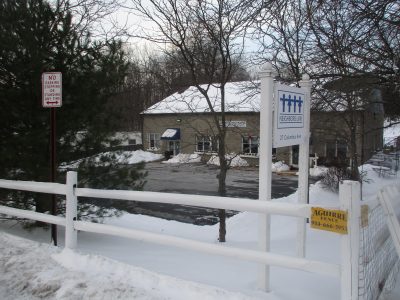‘People are Struggling’: Local Immigrants Face Uncertainty Despite Hope for the Future

For all the immense difficulties 2020 has brought to families across the region and the nation, the plight of many immigrants this year has been especially dire.
The loss of lives and livelihoods, food insecurity and an uncertain future have been widespread throughout society. But the likelihood of immigrants working in service jobs that require actual and not virtual attendance and living in cramped quarters, often in multigenerational families, is far greater than the general population, exposing them in greater numbers to the ravages of COVID-19, said Carola Bracco, executive director of the Mount Kisco-based Neighbors Link, which provides services, classes and training to clients throughout Westchester and surrounding counties and advocates for immigrants.
Coupled with the aggressive and unceasing enforcement by the U.S. Immigration and Customs Enforcement (ICE) and the often-changing immigration policies of the Trump administration, what has always been a difficult transition for newer arrivals has become dangerous in many instances.
“It’s probably been the biggest challenge people have seen in their lives,” Bracco said of the past four years for many in the local immigrant community. “Living in fear, not knowing whether or not there’s going to be additional policies or reversal in policies that possibly had been supported in the past. So I think it has been a debilitating time period these past four years, certainly made more horrifying by the pandemic.”
In a recent interview with The Examiner, Bracco and Karin Anderson Ponzer, director of Neighbors Link’s Community Law Practice, spoke of the challenges that immigrant families have endured, but also the hard-earned victories to make life more bearable and the hope that the United States will be a more hospitable place with the new administration.
The fear that has gripped communities with significant immigrant populations such as Mount Kisco, Peekskill, Ossining and White Plains has been real, Bracco said, not only for those who are among the estimated 11 million undocumented individuals, but their children who might have been born in the United States, their spouses, Deferred Action for Childhood Arrival (DACA) recipients and even some naturalized citizens.
Ponzer said there have been hundreds of families in the lower Hudson Valley that have been separated and deported.
“The idea that they are criminal aliens is a myth,” Ponzer said of a common attitude toward immigrants. “Sure, some have a criminal history. Some are U.S. citizens, some of them are foreign-born, but ICE enforcement targeted people that was easiest for them to find, otherwise law-abiding people that had immigration violations.”
Just because someone may have committed an immigration violation does not mean they are eligible to be deported under the law, Ponzer said. Immigration law is complex and a strong immigration attorney is typically needed to make sure a person’s rights are fully protected, she said.
What has made policies of aggressive enforcement difficult is that most families have members that are of different immigration status, Bracco said. For example, members of the same family may have arrived at different intervals, so the process to potentially become citizens is at different stages. An older child could be a DACA recipient while a younger child born in the U.S. is a citizen.
“I can’t think of a single family that doesn’t have different statuses within the family,” Bracco noted.
Having saved DACA from termination may have been one of the most important achievements of the past few years. In fact, the U.S. Supreme Court didn’t uphold the program but instead outlined what the administration should have done to legally end the program.

Bracco and Ponzer agreed that comprehensive immigration reform is needed to protect recipients from the whims of an administration. Also, many of the roughly 800,000 DACA recipients are now adults, having been educated in the United States, building careers and families. There are now about 250,000 children belonging to those who received that status, Bracco said.
“DACA was such an important thing; it continues to be such an important lifeline for a large number of people,” Bracco said. “(But) we have DACA because we couldn’t make anything else work.”
Comprehensive immigration reform must include a pathway for citizenship, Ponzer said. It doesn’t mean that the country’s undocumented population become citizens overnight, but it provides a mechanism for many of those people to apply for and pursue citizenship.
“It’s still a complex process that can take years, but understand there are barriers (today) that don’t even allow them to apply,” Bracco said.
With policy changes and a shift in enforcement priorities, she said that the incoming Biden administration can have a significant impact to help prevent those who are in the country from being deported, Ponzer explained.
What will be more difficult to change is to help those looking to immigrate to the United States, she said. During the past four years, refugee admissions have plummeted from the historical ceiling of up to 100,000 people a year when instituted about 40 years ago, to 15,000 for 2021. The current administration has also tried to discourage asylum seekers.
Another positive was New York State’s 2019 passage of the Green Light Law, which allows undocumented immigrants to apply for a standard license so they can operate a car legally, which is safer for the general public, Bracco said. Those seeking the standard licenses can take drivers education, then look to pass a driving test and be required to obtain insurance, making the roads safer while also giving the undocumented population the ability to work more easily and transport their children, she said.
The standard license does not allow for any other privileges, such identification to board an airplane.
The state has also prohibited ICE personnel from going to New York’s courthouses to try and arrest immigrants who are appearing for tickets or other offenses or to testify in a matter, Bracco said.
With the new administration poised to take over in about three weeks, there are still landmines for immigrants and their advocates to navigate. Ponzer said President Trump has prioritized rescinding the current asylum system and promoting expedited removal. The latter is currently the law of the land, giving ICE officers the authority to pull people targeted for deportation off the streets, she said.
“The administration implemented in October expedited removal,” Pozner said. “They haven’t actually pulled the trigger on that yet, perhaps because of COVID, maybe because of staffing.”
For Neighbors Link, the last four years, and in particular, the past nine months with the pandemic, has forced the organization to beef up its staff, Bracco said. The need to educate local immigrant families on how to protect themselves from the virus or working with them to narrow the inequities in access to technology so their children can attend virtual classes has been essential.
Neighbors Link has a roster of some 400 volunteers, but four new staff members were added this year along with bolstering its legal services.
“In the past year, it’s been these volunteers that have really allowed us to really serve the community in a very personal way,” Bracco said.
Despite hopes that better days lie ahead, the Jan. 20 inauguration won’t immediately change the situation for leery immigrants, she said. The ICE policies will still be in place until the new administration provides direction to the agency.
Then there’s the ongoing economic uncertainty because of the pandemic.
“I think this continues to be very difficult times,” Bracco said. “It will take quite awhile for our economy to come back. While there may be some hope, I think right now hope is a luxury that is very difficult to rely on. I think the people are struggling and I think this coming year is going to be harder for the families, that’s for sure.”

Martin has more than 30 years experience covering local news in Westchester and Putnam counties, including a frequent focus on zoning and planning issues. He has been editor-in-chief of The Examiner since its inception in 2007. Read more from Martin’s editor-author bio here. Read Martin’s archived work here: https://www.theexaminernews.com/author/martin-wilbur2007/
